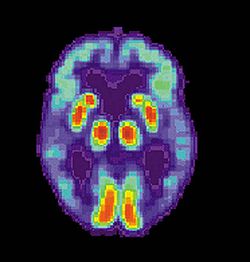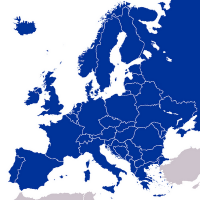Difference between revisions of "Atheism and Alzheimer's disease"
Conservative (Talk | contribs) (→Regular prayer/meditation and larger frontal lobes) |
Conservative (Talk | contribs) (→Regular prayer/meditation and larger frontal lobes) |
||
| Line 22: | Line 22: | ||
According to ''Scientific American'': | According to ''Scientific American'': | ||
{{cquote|Several studies have revealed that people who practice meditation or have prayed for many years exhibit increased activity and have more brain tissue in their [[frontal lobe]]s, regions associated with attention and reward, as compared with people who do not meditate or pray.<ref>[http://www.scientificamerican.com/article/askthebrains/ Ask the Brains, Scientific American, Dec 23, 2011]</ref>}} | {{cquote|Several studies have revealed that people who practice meditation or have prayed for many years exhibit increased activity and have more brain tissue in their [[frontal lobe]]s, regions associated with attention and reward, as compared with people who do not meditate or pray.<ref>[http://www.scientificamerican.com/article/askthebrains/ Ask the Brains, Scientific American, Dec 23, 2011]</ref>}} | ||
| − | |||
The Centre for Neuro Skills say about the frontal lobes and their function: | The Centre for Neuro Skills say about the frontal lobes and their function: | ||
Revision as of 06:01, February 11, 2019

Alzheimer's disease is "characterised by loss of neurons and synapses in the cerebral cortex and certain subcortical regions. This loss results in gross atrophy of the affected regions, including degeneration in the temporal lobe and parietal lobe, and parts of the frontal cortex and cingulate gyrus.[1] Some of the primary symptoms of alzheimer's disease are: memory problems, mood swings, emotional outbursts, brain stem damage which impairs function in the heart, lungs plus causes disruption of various other bodily processes.[2]
The current global atheist population mostly resides in East Asia (particularly China) and in secular Europe/Australia primarily among whites.[3] See: Global atheism
Alzheimer's disease is more common among the elderly and in terms of global atheism and aging populations, global atheism is facing significant challenges in terms of aging populations in East Asia and Europe and atheism is expected to shrink in terms of its market share of the world's population (see: Desecularization).
Contents
Religious practices and the progression of Alzheimer's disease
See also: Atheism and the brain

WebMd reported in 2005, "Religious practices and spirituality may slow the progression of Alzheimer's disease."[4]
The abstract for the 1990 journal article Spirituality, religion, and Alzheimer's disease published in the Journal of Health Care Chaplaincy indicates:
| “ | The chaplain's ministry to persons with dementia, often of the Alzheimer's type, is vitally relevant to their clinical well-being. No chaplain should even think that because someone is demented, they can no longer be reached spiritually. While few scientific studies exist, clinical experience and anecdotal accounts suggest that selected pastoral interventions can enhance the quality of life of the mildly, moderately, and even severely demented individual.[5] | ” |
Regular prayer/meditation and larger frontal lobes
See also: Religiosity and larger frontal lobes and Atheism and emotional/intrapersonal intelligence and Atheism and irrationality and Homosexuality and frontal lobe injury
According to Scientific American:
| “ | Several studies have revealed that people who practice meditation or have prayed for many years exhibit increased activity and have more brain tissue in their frontal lobes, regions associated with attention and reward, as compared with people who do not meditate or pray.[6] | ” |
The Centre for Neuro Skills say about the frontal lobes and their function:
| “ | The frontal lobes are considered our emotional control center and home to our personality. There is no other part of the brain where lesions can cause such a wide variety of symptoms (Kolb & Wishaw, 1990). The frontal lobes are involved in motor function, problem solving, spontaneity, memory, language, initiation, judgement, impulse control, and social and sexual behavior. The frontal lobes are extremely vulnerable to injury due to their location at the front of the cranium, proximity to the sphenoid wing and their large size. MRI studies have shown that the frontal area is the most common region of injury following mild to moderate traumatic brain injury (Levin et al., 1987).
There are important asymmetrical differences in the frontal lobes. The left frontal lobe is involved in controlling language related movement, whereas the right frontal lobe plays a role in non-verbal abilities. Some researchers emphasize that this rule is not absolute and that with many people, both lobes are involved in nearly all behavior.[7] |
” |
Healthline.com declares about the frontal lobe:
| “ | The frontal lobe is the part of the brain that controls important cognitive skills in humans, such as emotional expression, problem solving, memory, language, judgment, and sexual behavior. It is, in essence, the “control panel” of our personality and our ability to communicate.
It is also responsible for primary motor function, or our ability to consciously move our muscles, and the two key areas related to speech, including Broca’s area. The frontal lobe is larger and more developed in humans than in any other organism.[8] |
” |
The health writer Molly McAdams writes about the function of the frontal lobes:
| “ | Higher-level thinking is supported by the frontal lobes. Activity in these lobes allows us to reason, make judgments, make plans for the near and far future, make choices, take action, solve problems and generally control our living environment. Without fully functioning frontal lobes, you may have intelligence, but you wouldn’t be able to put it to use.[9] | ” |
Reluctance of Western atheists to engage in meditation
Atheist Greta Christina wrote at the website Humananist.com:
| “ | A lot of atheists, humanists, and other nonbelievers are leery or dismissive of meditation and mindfulness. Some see it as an irretrievably religious or spiritual practice, and want no part in it. Others are put off by the faddish, overused, buzzword quality of the practice and the terminology. And I can understand that. For years, I stayed away from trying this stuff out, for exactly those reasons. I was interested in the practice—I had friends who did it, and who seemed to get a lot out of it. But I couldn’t find anyplace to learn that didn’t base their teaching on Buddhism or some other religion. And I’m too ardent an anti-religionist to “take what you need and leave the rest,” the way many nonbelievers do with religion. After all, I literally wrote the book on angry atheism. For me, trying to learn meditation in a Buddhist center would be like trying to learn meditation in a room full of fingernails scraping on blackboards.[11] | ” |
Although many atheists in the Western World are reluctant to meditate, in the East nontheist Buddhists often practice meditation.[12]
Effects of Spiritual Group Therapy on Caregiver Strain in Home Caregivers of the Elderly with Alzheimer's Disease
The abstract of the 2017 journal article Effects of Spiritual Group Therapy on Caregiver Strain in Home Caregivers of the Elderly with Alzheimer's Disease published in the Archives of Psychiatric Nursing indicated:
| “ | Care of patients with Alzheimer's disease is one of the most difficult types of care that exposes the caregiver to a high level of care strain. The present research aimed at determining the effect of spiritual care on caregiver strain of the elderly with Alzheimer's disease...
Spiritual care can reduce care strain in home caregivers of the elderly with Alzheimer's disease.[13] |
” |
Secular Europe and Alzheimer's disease
See also: Secular Europe

If left unchecked, roughly 9 million people in the EU are expected to have dementia by 2030 – approaching twice the population of Denmark.[14]
From a global perspective, Europe is more secular/atheistic than the rest of the world although it does have a considerable amount of religious immigrants who have significantly higher birth rates (see: Secular Europe and Atheist population and Global atheism).
According to Politico:
| “ | Alzheimer’s disease and related dementias are putting an enormous socio-economic burden on healthcare systems, families, and caregivers. Populations in Europe are ageing, and with this will grow the prevalence of Alzheimer’s disease. If left unchecked, roughly 9 million people in the EU are expected to have dementia by 2030 – approaching twice the population of Denmark.[15] | ” |
According to the abstract of the 2017 journal article Prevalence and incidence of Alzheimer's disease in Europe: A meta-analysis published in the journal Neurologia:
| “ | The prevalence of Alzheimer's disease in Europe was estimated at 5.05% (95% CI, 4.73-5.39). The prevalence in men was 3.31% (95% CI, 2.85-3.80) and in women, 7.13% (95% CI, 6.56-7.72), and increased with age. The incidence of Alzheimer's disease in Europe was 11.08 per 1000 person-years (95% CI, 10.30-11.89). Broken down by sex, it was 7.02 per 1000 person-years (95% CI, 6.06-8.05) in men and 13.25 per 1000 person-years (95% CI, 12.05-14.51) in women; again these rates increased with age.[16] | ” |
Atheist controlled mainland China and Alzheimer's disease
See also: China and atheism
China has the world's largest atheist population.[18][19] China practices state atheism (see: China and atheism).
East Asia contains about 25 percent of the world’s population. China’s population represents 20 percent of the people on earth.[20]
Razib Khan points out in Discover Magazine, "most secular nations in the world are those of East Asia, in particular what are often termed “Confucian societies.” It is likely therefore that the majority of the world’s atheists are actually East Asian."[21] See: Asian atheism and Global atheism
China and Alzheimer's disease
In 2017, the South China Morning Post indicated:
| “ | No health care problem looms larger in China than Alzheimer’s disease. It is the fastest-growing major disease on the mainland, with at least 9.5 million sufferers and perhaps as many undiagnosed cases. Almost a million Chinese are diagnosed every year with Alzheimer’s, with the number of new cases expected to rise sharply by around 2030.
Of the major diseases in China, Alzheimer’s also has the greatest mismatch between the number of patients and amount of specialised care available. [22] |
” |
See also
- Atheism and the brain
- Religiosity and larger frontal lobes
- Religious individuals and thicker cerebral cortices
- Atheism and autism
- Atheism and intelligence
- Atheism and health
- Atheism and obesity
- Atheism and cancer
References
- ↑ Neurodegeneration in Alzheimer's and Parkinson's
- ↑ Alzheimer's disease
- ↑ A surprising map of where the world’s atheists live, By Max Fisher and Caitlin Dewey, Washington Post, May 23, 2013
- ↑ Religion, Spirituality May Slow Alzheimer's, WebMD, 2005
- ↑ Spirituality, religion, and Alzheimer's disease. by SG1, Whitehouse PJ., Journal of Health Care Chaplaincy, 1999;8(1-2):45-57.
- ↑ Ask the Brains, Scientific American, Dec 23, 2011
- ↑ Frontal lobes, The Centre for Neuro Skills
- ↑ Frontal lobe, Healthline.com
- ↑ [What Are the Functions of Frontal Lobe of Brain?] by Molly McAdams
- ↑ Mind is Matter, Greta Christina, The Humanist.com
- ↑ Mind is Matter, Greta Christina, The Humanist.com
- ↑ Christians Talk about Buddhist Meditation, Buddhists Talk About Christian Prayer, edited by Rita M. Gross, Terry C. Muck, page 89
- ↑ [Effects of Spiritual Group Therapy on Caregiver Strain in Home Caregivers of the Elderly with Alzheimer's Disease] by Mahdavi B1, Fallahi-Khoshknab M2, Mohammadi F1, Hosseini MA1, Haghi M1., Archives of Psychiatric Nursing, 2017 Jun;31(3):269-273. doi: 10.1016/j.apnu.2016.12.003. Epub 2016 Dec 7.
- ↑ Addressing Alzheimer’s disease in Europe: What still needs to be done?, Politico, 2016
- ↑ Addressing Alzheimer’s disease in Europe: What still needs to be done?, Politico, 2016
- ↑ Prevalence and incidence of Alzheimer's disease in Europe: A meta-analysis by Niu H1, Álvarez-Álvarez I2, Guillén-Grima F3, Aguinaga-Ontoso I2., Neurologia. 2017 Oct;32(8):523-532. doi: 10.1016/j.nrl.2016.02.016. Epub 2016 Apr 26.
- ↑
- Top 50 Countries With Highest Proportion of Atheists / Agnostics (Zuckerman, 2005)
- A surprising map of where the world’s atheists live, Washington Post By Max Fisher and Caitlin Dewey May 23, 2013
- ↑ Top 50 Countries With Highest Proportion of Atheists / Agnostics (Zuckerman, 2005)
- ↑ A surprising map of where the world’s atheists live, Washington Post By Max Fisher and Caitlin Dewey May 23, 2013
- ↑ The Growth of Christianity in East Asia
- ↑ Most atheists are not white & other non-fairy tales, Discover magazine
- ↑ China’s millions of Alzheimer’s patients cannot wait any longer for specialised care, South China Morning Post, 2017
